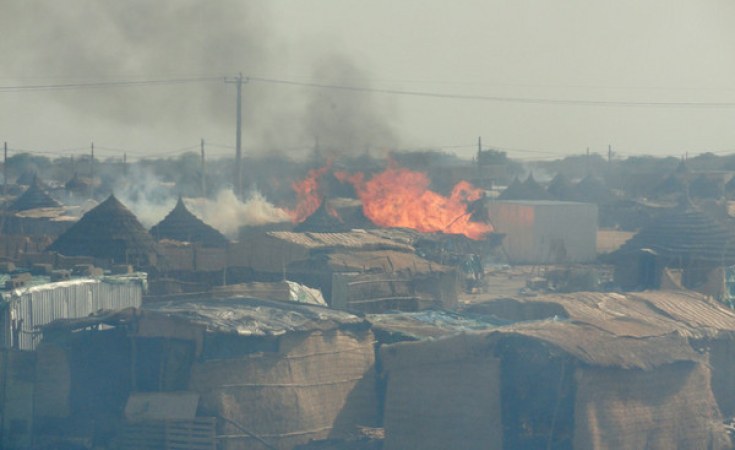On Saturday, 52 people were killed and 64 injured in tribal clashes, according to Bulabek Deng Kuol, Sultan of the Ngok Dinka in the disputed Abyei* border region between Sudan and South Sudan. The UN Interim Security Force in Abyei** (UNISFA) confirmed in a statement on Sunday the death of a peacekeeper.
The statement said that another armed group attacked the headquarters of UNICEF in Agok after people fled to it, but UNICEF forces repelled the attack. One of its peacekeepers, who came from Ghana, was killed.
UNICEF said in a press statement on Sunday that the armed attack occurred at 16:00 in Nyinkuac, Majbong, and Khadian. Several people fled to UNISFA civilian camps in search of safety.
Kuol told Radio Dabanga that "a group of unruly men" hid among displaced members of the South Sudanese Nuer tribe and set fire to a house in their camp. He said that the men planned to cause conflict between the Nuer displaced people and the local community.
The Dinka sultan explained that Ngok Dinka youths and police rushed to the camp to find out what was going on. As they arrived, the incident was developing into clashes between the attackers and the Nuer.
UNISFA expressed regret over the attack and called for an immediate investigation and accountability for those involved in the armed attack. In its statement, it stressed that its forces are committed to their mandate to protect civilians and preserve the peace process in the Abyei area.
At least 34 people were killed and 34 others injured in attacks in Abyei mid-November. Deng Bul, security advisor for the Abyei region, attributed the cause of the conflict to a dispute over borderland between Abyei and Tog governorate in Warrap state, where the attacking group claims to be dependent on land south of the Kiir River.
Reliable sources told Radio Dabanga that an attack which killed 5 people in May was carried out by the armed movement 'Titabai', which is affiliated with South Sudan, and engaged in cattle rustling. The region witnesses many cases of cattle rustling, hijacks, and other robberies.
The Ngok Dinka are indigenous inhabitants of Abyei and reside there all year long. Relationships between the Ngok Dinka and Misseriya tribes improved when they started holding regular peace conferences on conflict drivers, such as cattle raids, grazing areas, protection of crops, and access to water, and signed a peace deal five years ago.
Mid-April, Sudan and South Sudan agreed that it is important to find a sustainable solution that enjoys support from both countries. Since the secession of South Sudan from Sudan in 2011, both countries claim the oil-rich region of Abyei.
After joint meetings between the governments of Sudan and South Sudan in Khartoum that month, Kuol said that it is the wish of all people in the disputed region to find a final solution to the Abyei issue that will lead to stability in the region.
*Abyei
Since the secession of South Sudan from Sudan in 2011, both countries claim the border area of Abyei. The oil-rich region is inhabited primarily by members of the South Sudanese Dinka Ngok clan. It is also the seasonal home of the Sudanese Arab Misseriya herder tribe.
The Abyei status referendum, in which the residents of the region would decide either to remain part of Sudan or become part of South Sudan, was planned to be held simultaneously to the South Sudanese independence referendum in January 2011, but was postponed indefinitely because of disagreements over the process.
**UNISFA
UNISFA was established by the UN Security Council in June 2011 to monitor and verify the redeployment of armed forces from Abyei. UNISFA also has a mandate to protect civilians under imminent threat of physical violence, to protect the area from incursions by unauthorised elements, and ensure security.


